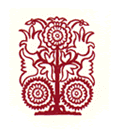Bakeless' letter continued, "The subsequent court-martial record and various other documents show that Sergeant Thomas Hickey, of the general's Life Guard was a ring-leader in this. They also show that he lived in Wethersfield for some time before 1775. "I am wondering: (a) whether you know of any local records that might list him, tax lists, lists of householders, or anything of the sort; (b) and also whether you can suggest where I might make any further inquiries."
The letter had been annotated "ans 6/19/58". There was no copy of a return letter but the word "over" inscribed at the bottom-right corner directed me to two columns of handwritten notes on the backside by what appeared to be the same author. Although more modern than the penmanship of Samuel Hanmer, the interpretation was equally difficult for me who I realized had been somewhat spoiled by having read (or written) little other than machine-printed lettering for probably the last two decades, if not longer.
The back page notes said such things as: "N.Y. City during the Am. Rev Mercantile Library Assoc. of NYC 1861, Proceeding of the Comm for the Hearing, June 22, 1776 Minutes of Gen Court martial which tried Thos Hickey etc."; and "Mayor of N.Y. David Matthews one of 13 Jail at Hartford moved in a week to Litchfield - (other 10 to Norwich)". But there is no mention of Thomas Hickey as a Wethersfield resident in any of the annotations.
While I was looking at the Bakeless inquiry, Melissa continued her search and found another Thomas Hickey folder. It had just one item - a 2/22/1967 article from what was then one of Hartford’s two daily newspapers - the Times. The author was William Keifer and bore the headline "Washington, Wethersfield and the Poisoned Peas."
"It is a known fact of history: George Washington stopped at Wethersfield. "An almost unknown fact of history is this: An infamous Wethersfield resident almost stopped Washington forever with a plate of peas. "The peas were poisoned and Thomas Hickey - listed in the old histories as a resident of Wethersfield almost succeeded in assassinating George Washington."
The article goes on to tell of Hickey's conviction and hanging "on charges of mutiny, sedition and 'treacherous correspondence with the enemies of the Colonies.'" And cites as a source Benson J. Lossing's History of the American Revolution (1906) which describes Hickey's crime as a "hellish plot" and a "foul conspiracy".
"The book also describes Hickey as a 'dark-complexioned Irishman', a deserter from the British Army 'several years before', and a resident of Wethersfield 'where he bore a good character and was selected (to be Washington's bodyguard) from the ranks of Knowlton's Connecticut Rangers. "Hickey’s signature can be found in one old Wethersfield storekeepers book, now in the Wethersfield Historical Society."
The remainder of the article tells of the attempt by Thomas Hickey, as a part of a conspiracy, to poison the General with the cooperation of Washington's housekeeper, the unnamed daughter of Samuel Fraunces, "proprietor of New York's historic Fraunces Tavern where Washington later bade farewell to his troops." Hickey managed to place the poison in the peas however the housekeeper told Washington of the plot. The General ordered that the lethally laced legumes be fed to some backyard hens, which subsequently were observed to become sick and die. Hickey and others were then arrested.
"But of all the conspirators only Thomas Hickey made his mark - however small in our national history."

(Washington's Farewell, Long Room,
Fraunces Tavern, December 4, 1783,
Henry Hintermeister, 1937.)
Melissa's continuing search came up with no other references to Thomas Hickey in the WHS archives. So I ended that day's research with potentially a more complicated and more colorful plot against Washington but no firsthand evidence that the Thomas Hickey actually lived in our ancient town.
But there were also more sources to check out. In addition to the Bakeless book there was now also Lossing's History of the American Revolution mentioned in the Hartford Times article, and one other totally unexpected possibility. The Education Director for the Society Mary Pat Knowlton joined in our hunt and, when she saw the newspaper piece, left immediately to go home and check through her personal copy of Knowlton's Connecticut Ranger source material. It wasn't until I replayed that day's research activities in my mind that the eponymous relationship between the latest research team member and the subject matter of our latest search sank in.
Go to Next Chapter
Go to Thomas Hickey Table of Contents
Go to Wethersfield Historical Society Home Page

No comments:
Post a Comment